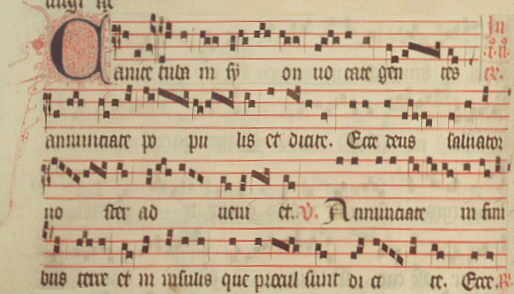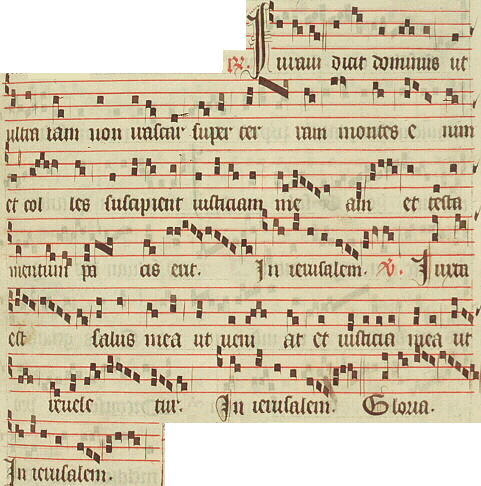Even Years: Venerable Bede, Commentary on Luke
| At ait Maria: Magnificat anima mea Dominum, et exsultavit spiritus meus in Deo salutari meo.
| Mary said: My soul glorifies the Lord, my spirit rejoices in God, my Saviour.
| | Tanto, inquit, me Dominus tamque inaudito munere sublimavit, quod non ullo linguae officio explicari, sed ipso vix intimi pectoris affectu valeat comprehendi, et ideo totas animae vires in agendis gratiarum laudibus offero, totum in contemplanda magnitudine eius, cui non est finis, quicquid vivo, sentio, discerno, gratulanter impendo, quia et eiusdem Iesu, id est salutaris, spiritus meus aeterna divinitate laetatur, cuius mea caro temporali conceptione fetatur.
| The Lord, she said, has exalted me with a great and unheard of gift, which cannot be explained in any words and can scarcely be understood by the deepest feelings of the heart. And so I offer up all the strength of my soul in thanksgiving and praise. In my joy I pour out all my life, all my feeling, all my understanding in contemplating the greatness of him who is without end. My spirit rejoices in the eternal divinity of Jesus, my Saviour, whom I have conceived in time and bear in my body.
| | Quia fecit mihi magna qui potens est, et sanctum nomen eius.
| For he who is mighty has done great things for me, and holy is his name.
| | Ad initium carminis respicit ubi dictum est: Magnificat anima mea Dominum. Sola quippe anima illa, cui Dominus magna facere dignatur, dignis eum praeconiis magnificare et ad consortes eiusdem voti ac propositi potest cohortando dicere: Magnificate Dominum mecum, et exaltemus nomen eius in invicem.
| Mary looks back to the beginning of the canticle, to the words: My soul glorifies the Lord. Only the soul for whom the Lord does great things can glorify and praise him as he deserves; only that soul can call on those who share the same desire and intent: Glorify the Lord with me. Together let us praise his name.
| | Nam qui Dominum, quem cognovit, quantum in se est magnificare et nomen eius sanctificare contempserit, minimum vocabitur in regno caelorum. Sanctum autem nomen eius vocatur, quia singularis culmine potentiae transcendit omnem creaturam atque ab universis quae fecit longe segregatur.
| The man who refuses to glorify with all his power the Lord whom he knows, and to keep his name holy, will be called least in the kingdom of heaven. God's name is called holy because he transcends the whole of creation by the loftiness of his unparalleled power, and because he is set apart from all those things which he has made.
| | Suscepit Israel puerum suum, memoratus misericordiae suae.
| He has lifted up Israel, his child, remembering his mercy.
| | Pulchre puerum Domini appellat Israel, qui ab eo sit ad salvandum susceptus, oboedientem videlicet et humilem, iuxta quod Osee dicit: Quia puer Israel, et dilexi eum.
| In beautiful fashion Mary calls Israel the child of the Lord, for Israel has been lifted up by him to be saved, seeing that Israel was obedient and humble, in accordance with the words of Hosea: Because Israel was a child, I loved him.
| | Nam qui contemnit humiliari, non potest utique salvari nec dicere cum Propheta: Ecce enim Deus adiuvat me, et Dominus susceptor est animae meae. Quicumque autem humiliaverit se sicut parvulus, hic est maior in regno caelorum.
| Now anyone who refuses to humble himself simply cannot be saved, nor can he say with the prophet: Behold, the Lord is my helper; it is God who lifts up my life. But whoever humbles himself like a child is the greatest in the kingdom of heaven.
| | Sicut locutus est ad patres nostros, Abraham et semini eius in saecula.
| As he spoke to our fathers, to Abraham and to his posterity for ever.
| | Semen Abrahae non carnale sed spiritale significat, id est non eius tantum carne progenitos, sed sive in circumcisione seu in praeputio fidei illius vestigia secutos. Nam et ipse in praeputio positus credidit, reputatumque est ei ad iustitiam.
| Mary does not mean the natural but the spiritual posterity of Abraham; that is, not those who have only descended from him physically, but those who follow in the steps of his faith, whether they are circumcised or uncircumcised. For he too believed while uncircumcised and it was considered as justifying him.
| | Adventus ergo Salvatoris Abrahae est et semini eius in saecula promissus, hoc est filiis promissionis, quibus dicitur: Si autem vos Christi, ergo Abrahae semen estis secundum promissionem heredes.
| The coming of a Saviour therefore was promised to Abraham and to his posterity for ever, that is, to the children of the promise, to whom are addressed the words: If you belong to Christ, then you are the posterity of Abraham, the heirs he was promised.
| | Bene autem vel Domini vel Ioannis exortum matres prophetando praeveniunt, ut sicut peccatum a mulieribus coepit, ita etiam bona a mulieribus incipiant, et quae per unius deceptionem periit, duabus certatim praeconantibus mundo vita reddatur.
| It was right that the mothers of both the Lord and John should anticipate the birth of their children in prophecy. Just as sin began from women, so too it was fitting that blessings should spring from women, and that life which was lost through the deception of one woman, should be given back to the world by these two women who rival each other in giving praise.
|
|
Odd Years: An ancient Greek sermon (12) translated into Latin (PLS 4, 770-771)
| Quoniam
tempus venit, ut de adventu et incarnatione domini loquamur sanctae charitati
vestrae, ideo tacendum non est diebus his... Ergo gaudeat Sion: id est, mens
nostra, speculans futura bona, respuens a se mala. Subsequitur versiculus,
dicens : ecce ueniet habitator in te. Quis est iste habitator, nisi qui nos
habere voluit, et sibi congregare peculiaremque populum confirmare? Iste
habitator ipse est, de quo alio loco cecinit propheta dicens : Quoniam
deambulabo et inhabitabo in eis, et ero illorum deus, et ipsi mihi erunt
populus.
| Now that the season has arrived for me to speak to you about the Lord's incarnation and his coming among us, it would not be right to let these days pass by in silence. Rejoice, Zion! Your King is coming. Let Zion rejoice, I say; and by Zion I mean our own souls. Let our souls reject all that is evil and fix their gaze on the blessings that are to come. See, he is coming to dwell among you. To dwell among us? But who? None other than the God who would make us his own possession, desiring to gather a people to himself and establish them as his chosen portion. The God who would dwell in our midst is the subject of another prophetic text that reads: I shall walk among them and dwell in their midst; I shall be their God and they will be my people.
| | Iste
habitator cum possederit omnia interiora nostra, aget omnia sancta in nobis,
perfecta, irreprehensibilia. Iste ergo habitator possideat quos redemit,
perficiat quos inchoavit, perducat, quos de terra Babylonica eiecit. Ergo iste
habitator noster requiescit in nobis, glorificatur in medio nostrum, cum
viderint homines bona nostra opera, et glorificauerint patrem nostrum qui est
in caelis, Cuius facti sumus filii non pro obsequiis nostris, aut meritis, non
pro bona actione, quam non fecimus: sed pro eius misericordia et libertatem
accepimus, et in adoptionem filiorum annumerati sumus.
| When he has established his dwelling place within us and taken full possession of our souls, he will make our whole being holy, perfect, and blameless. Let him come then and take possession of those he has redeemed; let him dwell in their hearts and complete the work he has begun in them; let him go ahead of them, leading the way for them out of the land of Babylon. He will find his resting place among us and be glorified in our midst when other people see our good works and glorify our heavenly Father, whose sons we have become not through anything we have done to deserve it, nor on account of our good deeds, but solely because of his mercy. Yes, it is through God's mercy that we have received our freedom and are counted among his adopted sons.
| | Ergo
taliter glorificatur deus in medio nostri, quando in affectu charitatis
proficimus, et facimus quae praecepit, et persistimus in eis quae iussit,
glorificatur in medio nostri. Subsequitur et dicit, Quia dominus misit me ad
te. Nunc cognoscimus, quia dominus missus est ad nos redemptor, vita et salus,
pietas et gratuita gratia. Et quando nos videmus e limo terrae erigi ad
caelestia praemia, gaudeat cor credentium et laetetur: quaerat dominum ut non
mortua sed sicut viva anima nostra.
| God is glorified among us when we grow in love and compassion, when we carry out his commands and persevere in doing his will; these are the ways in which he is glorified. Now we know that the Lord has been sent to us as our redeemer, our life, and our healing, bringing us his loving mercy and grace beyond all our deserts. So when we see ourselves lifted up from the dust of the earth to receive a heavenly prize, let all of us believers be glad of heart and rejoice, and, as living souls raised up from the dead, let each one of us seek the Lord.
| | Pro
iis bonis domino quid retribuemus, nisi tantum deposita cervice, subiecto collo
pectus tundamus, dicentes quod dixit publicanus, deus propitius esto mihi
peccatori?... Et quia pietate sua perficit et imperfecta, subsequitur dicens:
Et in libro tuo omnes scribentur. Exultate de tantis muneribus eius, gaudete de
tantis bonis eius: Et si accepistis nolite gloriari, quasi non acceperitis,
ut ea quae accepistis, conserventur in vobis, et quae minus habetis de bonis,
perficiantur in vobis. Amen.
| What return shall we make to the Lord for such blessings? All we can do is to bow our heads and beat our breasts, saying with the publican: O God, be merciful to me a sinner! Rejoice, then, my friends, at these great gifts of his, exult in such great blessings! Take care not to ascribe to yourselves the good things you have received from him, for if you do, you will lose what you have. You must be convinced that you possess nothing that you have not received. And if you have received it, do not boast as though you had not. If you keep to this rule the gifts you have received will be preserved among you, and anything you now lack will be granted to you in full.
|
| |

